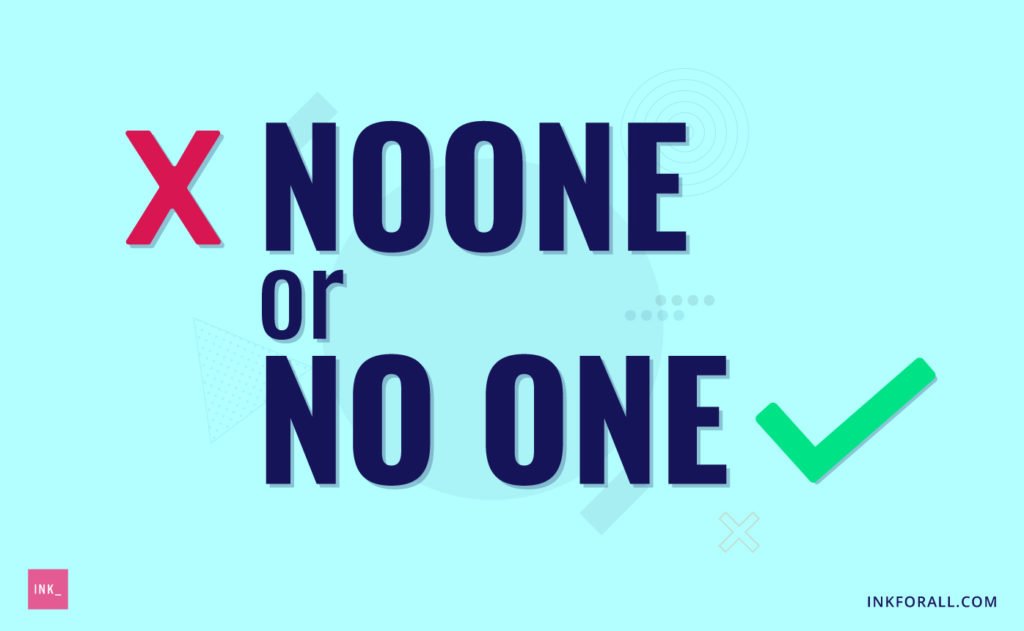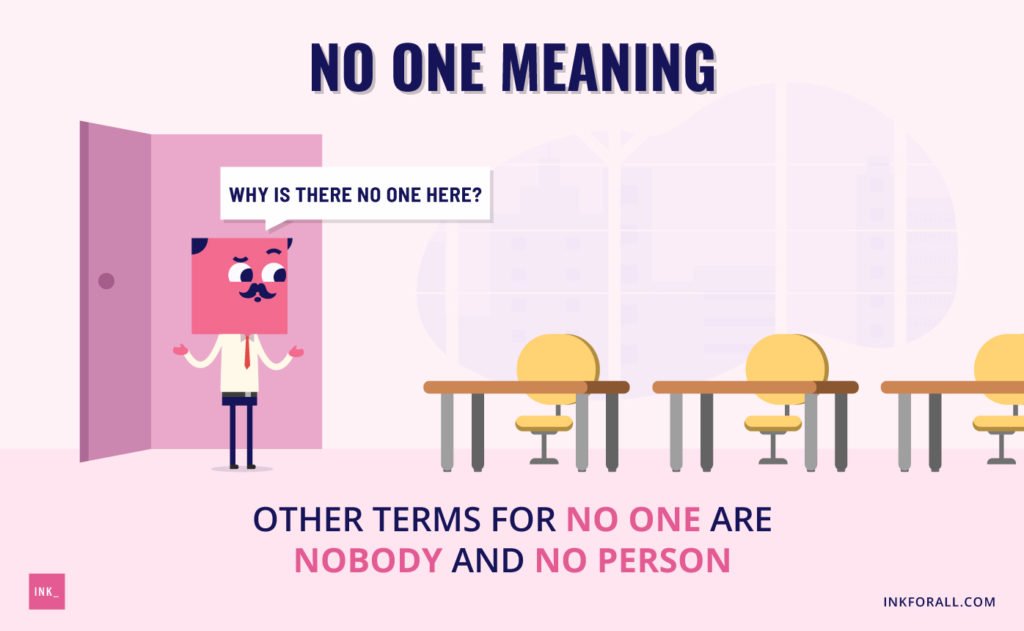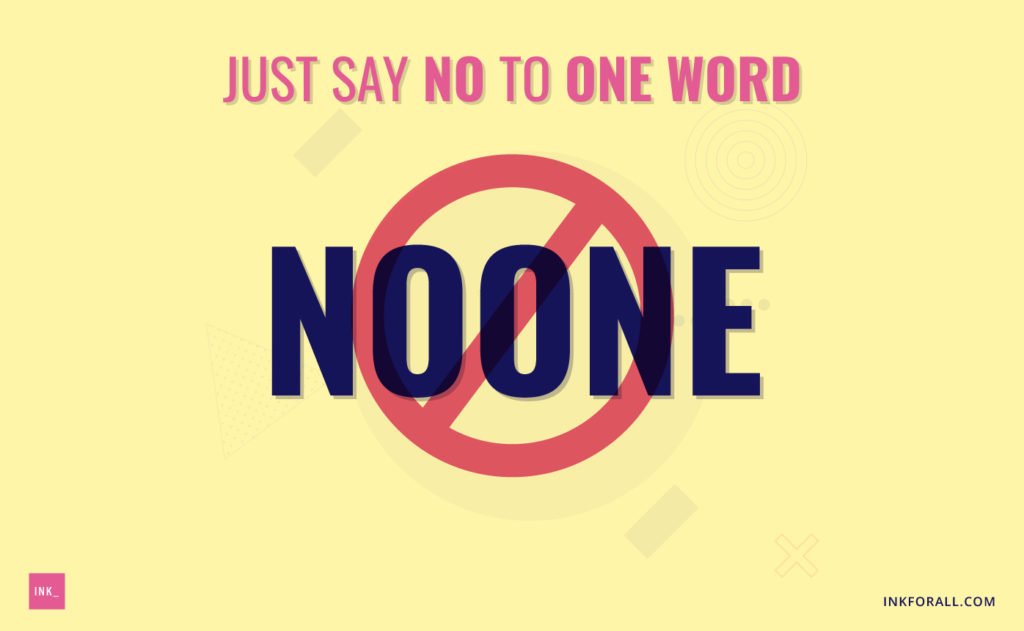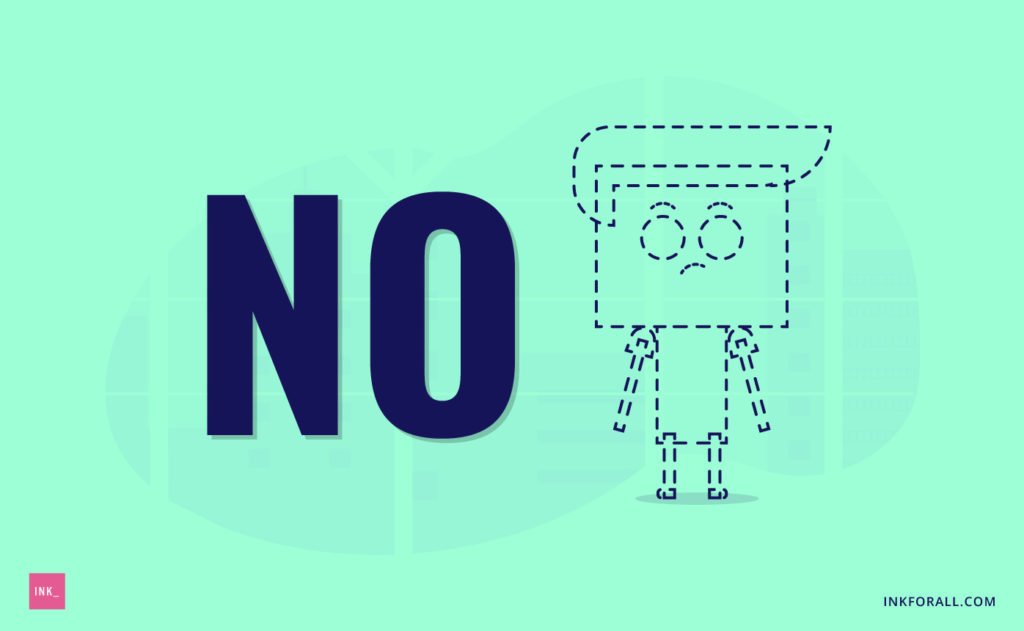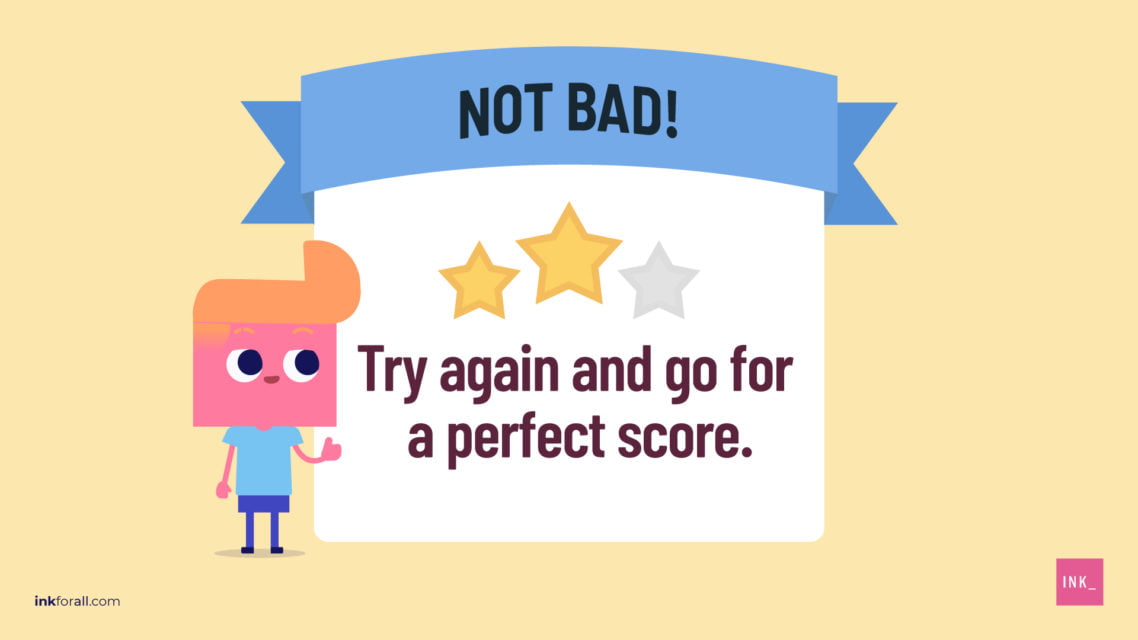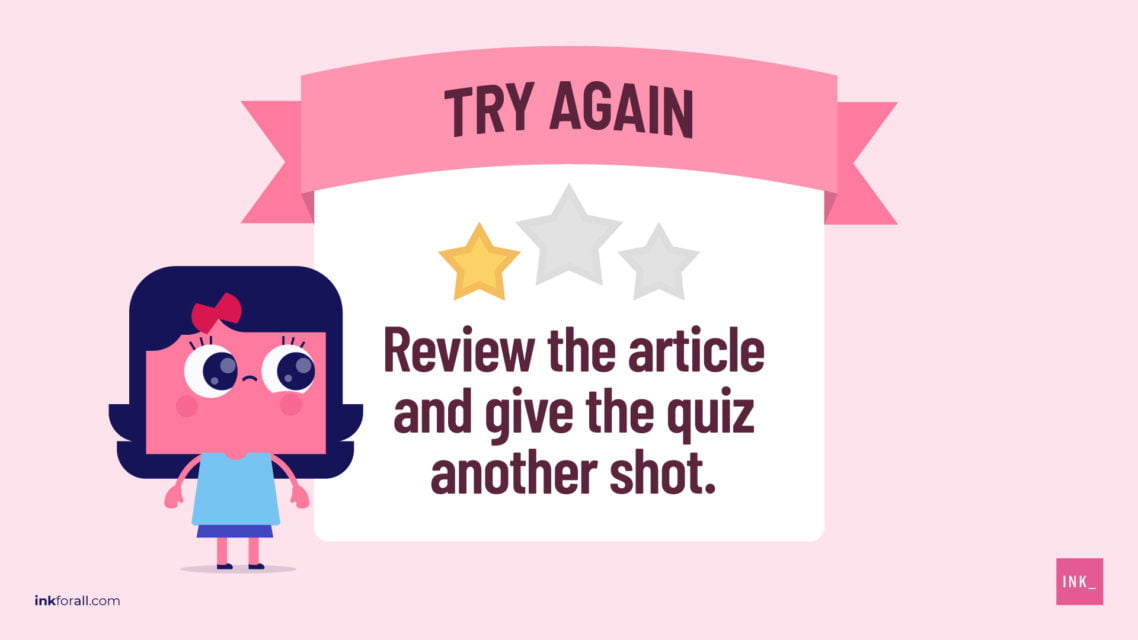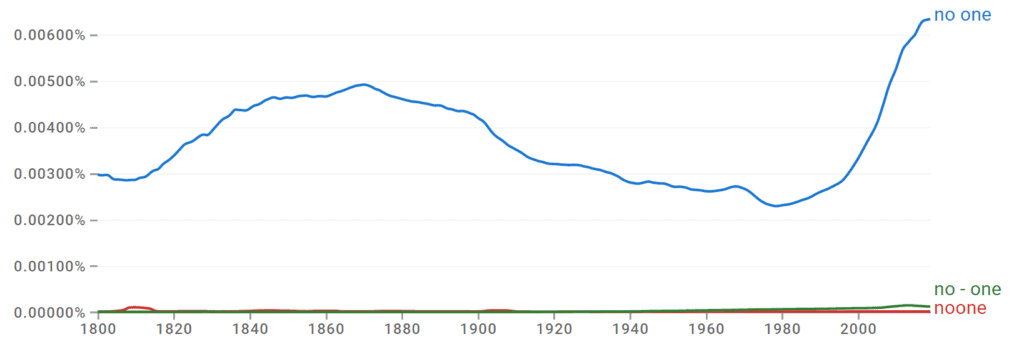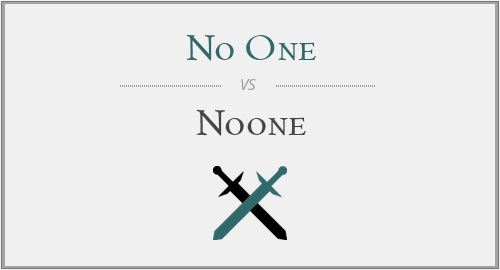Is it no-one or no one? Or, noone? In this guide, you’ll discover the difference between noone, no one, no-one, and nobody. Plus, you’ll see the best example sentences and explore synonyms you can use instead of these indefinite pronouns.
Main Noone or No One Takeaways:
- The correct way to spell no one is with two words.
- Noone is a common misspelling of no one. It’s never correct.
- No-one with a hyphen is a variant of no one. It’s technically correct in some contexts, but it isn’t commonly used. No one is always correct.
- Nobody is a more informal version of no one.
Which is Correct: No One or Noone?
The correct spelling is no one (two words). Noone is a common misspelling of no one. While no-one with a hyphen might be an acceptable variant in some situations, no one as two separate words is always correct. For this reason, we recommend always spelling no one as two words without the hyphen.
Is it No-one or No one?
You may see no one expressed with a hyphen as no-one. Notwithstanding, this variant isn’t common in modern English. Still, it does make rare appearances. However, it should not be used when writing out the phrase no one person. Instead, to ensure you always spell no one correctly, use two separate words. This is the optimal spelling. In this way, “noone” is never an acceptable spelling of no one.
What is Noone?
Noone (one word) is a misspelling of the indefinite pronoun no one (two words). Instead, no one spelled with two words and without a hyphen is always correct. Just like its less formal synonym nobody, the word no one means “no person” (No one/Nobody is home).
📝 No one is an indefinite pronoun that means no person.
Why Do People Write “Noone” Instead of “No One”?
There are two main reasons why some people spell “no one“ as “noone.” First, and the most obvious reason, is that they simply don’t know that “noone“ is an incorrect spelling. Second, words with two consecutive ‘Os‘ or ‘oo‘ are commonly known to have single phonemes. Take for instance the following words:
- neighborhood
- book
- foot
- hood
- food
Always keep in mind, “noone“ is not a word. Don’t get confused because its antonym “anyone” is spelled as one word. Or because “nobody,”“nowhere,” and “nothing” are also spelled as single terms. The correct indefinite pronoun is “no one.”
Is No one the Same as None?
While there is some overlap, the indefinite pronoun no one is not exactly the same as none. On one hand, no one refers to people only (No one responded to the question). On the other hand, none can refer to people and inanimate objects.
📝 No One Meaning:
- No one expresses the absence of people.
- It means no person or not anyone.
- This pronoun is commonly misspelled as noone.
How do you use no one in a Sentence?
Here are examples of how to use no one in a sentence:
Can you Start a Sentence with No one?
Yes, you can start a sentence with no one. In fact, no one is an indefinite pronoun that means no person. Since you can begin a sentence with other indefinite pronouns and pronouns in general, you can use no one and nobody in the same way. Always spell no one as two words. What’s more, if you start a sentence with a negative word like no one, be sure the rest of the sentence doesn’t include another negative. This is because double negativesare grammatically incorrect in English.
What do we use With no one: Has or Have?
Since no one is singular, we use the singular verb “has” with this indefinite pronoun, and never the plural “have.” Therefore, make sure your sentence reflects correct subject-verb agreement by always using has with no one.
What is Another Word for no one?
Here is a list of synonyms for no one:
- Nobody
- Not one person
- No person
- Not anybody
- No individual
- Not anyone
- Not a soul
For example, nobody is considered less formal than no one. As a result, it may be more appropriate for informal or casual conversations.
It’s extremely important to note that there are several synonyms and substitutable phrases for no one and nobody, but nuances in meaning should be considered when using them.
Taken a certain way, the phrase not anyone in the above example implies the possibility that someone special could potentially steer Liam away from trouble. For additional emphasis, you might write it as not just anyone.
However, the above phrasing suggests that Liam is unfortunately bound for trouble no matter what.
Nobody and no one are negative pronouns we use to form negative clauses. Never combine these with other negatives to form a double negative.
What is the Opposite of no One?
The literal opposite of no one is every one, which means every person. Here are several other antonyms for no one and nobody:
- Everyone
- Everybody
- All people
- Each and every one
- Every person
- One and all
Notice that every one and everyone are both included as antonyms for no one. It’s important to note that these words have distinct meanings and are not interchangeable.
- Every one (two words) refers to each single member of a group.
- Everyone (one word) refers to the collective members of a group.
Is it No One or Nobody?
The answer to this question isn’t cut and dry. Both nobody and no one are indefinite pronouns that mean not any person. Although both are technically correct, no one tends to be more common in formal writing, including professional and academic work.
How do you use Nobody and No One?
Nobody and no one both mean “not any person.” Additionally, they are indefinite pronouns. Although they mean and may be used interchangeably, no one is the preferred choice for formal, academic, and professional writing applications. Conversely, nobody is more common in formal situations. What’s more, nobody is usually more common in British English than in American English.
📝 Where do we use Nobody and No one?
- Where to use No one: formal contexts like academic and professional writing
- Where to use Nobody: informal contexts like casual conversations or messages
How to use no one and Nobody in a Sentence
Avoiding Sexism: Nobody and No One as Plural Indefinite Pronouns
Nobody and no one are typically considered singular pronouns. However, they’ve taken on new roles as plurals in the effort to minimize gender bias. One reason may be that the English language doesn’t currently have any universally accepted singular gender-neutral pronoun. For this reason, some contemporary may pair nobody and no one with plural possessive pronouns such as their.
These examples embrace gender inclusion by opting to use the plural their instead of the singular personal pronouns his or her.
Because this usage is not widely accepted yet, we recommend rewording your sentence to avoid any issues altogether. In addition, contemporary writers may also opt to use the singular they/their. This is because many LGBTQ+ communities prefer these gender-neutral pronouns.
Is Nobody a Negative Word?
The word nobody refers to an absence of people and is considered a negative pronoun. Negative pronouns are used to create negative clauses.
Other Examples of Negative Pronouns
- No
- None
- Nothing
- No one
- Neither
Two Negatives Never Make a Right
You should never use another negative word in the same clause with the words nobody, nothing, or no one.
Noone or No One: A Brief Recap
When it comes to noone and no one, the rules are simple. No one should be written out as two words. Moreover, we recommend that you avoid using a hyphen and opt for the always-correct spelling no one.
Just don’t ever spell it noone. Then again, who would do that? Nobody, right? 😜
Noone or No One? Let’s see if You’re no Longer Confused! Take the Quiz Below
Noone vs. No one Question #1
A. Noone
B. No-one
C. No one
D. All of the above.
Correct!
Wrong!
The answer is C. While no-one is technically correct in some contexts, it is rarely used. The preferred spelling is “no one” with two words.
Noone Question #2
Correct!
Wrong!
The answer is FALSE. “No one” refers to people only, while “none” can refer to people and inanimate objects.
No one Question #3
A. Possessive pronoun
B. Reflexive pronoun
C. Relative pronoun
D. Indefinite pronoun
Correct!
Wrong!
The answer is D. “No one” is an indefinite pronoun that means no person.
Noone or No one Question #4
A. No one have Superman’s strength.
B. No one has Superman’s strength.
Correct!
Wrong!
The answer is B. Since the word “no one” is singular, use the singular verb “has.”
No one Question #5
A. No person
B. Not one person
C. Noone
D. Not a soul
Correct!
Wrong!
The answer is C. “Noone” is a misspelling of the indefinite pronoun “no one.”
Noone Question #6
Correct!
Wrong!
The answer is WAS. Since “no one” is a negative pronoun, you shouldn’t add another negative to the sentence.
Noone vs No One Quiz Result
Expert!
Not bad!
Almost got it! Review the article and try again.
Read More: Alot or A lot or Allot? Here’s the Easiest way to get it Right
No one means not any person or nobody. But why do some people say noone or no-one? Is no one one word or two? Is it no one, noone, or no-one? All the answers to your questions are here. Learn the difference between no one, noone, and no-one.
No One, Noone, or No-One
- No one is the correct spelling and phrase that means nobody.
- No-one is a hyphenated form of no one, which is accepted by very few style guides.
- Noone is an incorrect word and a common error.
This image shows an Ngram of no one, noone, and no-one. It reveals that no one has been the most widely used phrase ever since.
The correct term to use is no one without the hyphen. It’s an indefinite pronoun that means nobody. Even though other pronouns like nobody, somebody, somebody, and someone are one word, no one is composed of two words.
This phrase means nobody, no person, or not a single person. It’s the opposite of everyone. For example:
- No one called me about the project changes.
- I want no one to know my secret.
No-one is only acceptable outside North America. This hyphenated word is an alternative spelling to no one, which means it has the same meaning.
No-one became popular in the mid-1940s. While many grammarians do not recommend this version because it’s more complicated than no one, others advocate its use. Consider this example:
- No one person can beat him.
Here, no one is used as an additional noun that emphasizes singularity. It can cause ambiguity, especially when the reader reaches “person.” Only then will the reader understand that “no one” means “no single” and not the indefinite pronoun.
The example below is an alternative.
- No-one person can beat him.
But, not everyone’s a fan of the hyphenated version no-one.
Noone is never right. Its spelling is not the same as nobody, somebody, or someone.
Examples of Using No One
Here are some examples of no one in a sentence.
- Everyone owes nothing and no one.
- No one warned us about the typhoon.
- No one in the class knows where Patty and Ricky went.
- “No one will protect us”: how Haiti has become deadly for journalists. (The Guardian)
- She Came Out of Nowhere, and Now No One in France Can Ignore Her. (NY Times)
- ‘The Blind Woodsman’ — Whose Designs Wow Millions — Says ‘No One Would Know’ Him Without Wife (People)
Is It No Ones or No One’s?
The correct phrase is no one’s when indicating possession or ownership. For example:
- The car outside is no one’s.
- No one’s daughter in town wanted to speak to him.
Final Word on No One, Noone, and No-One
I hope this guide cleared your confusion between no one, noone, and no-one. No one and no-one are both correct, while noone is wrong.
- No one is correct in all cases.
- No-one is acceptable in some contexts outside North America.
No-one
Словосочетания
no one — никто
no one to — некому
no one man — ни один человек, взятый отдельно
no one but me — никто, за исключением
no one was by — рядом никого не было
almost no one — почти никто, едва ли кто-нибудь
no one object — ни один предмет, взятый отдельно
one-by-one no — поочерёдно; одному
no one is home — дома никого нет
one man no man — ≅ один в поле не воин
no one there but me — никто, кроме меня
no one man [object] — ни один человек [предмет], взятый отдельно
no one else has come — никто больше не приходил
no one man can do it — в одиночку это никому не под силу
there is no one here — здесь никого нет
no one saw him, but I — никто, кроме меня, не видел его
no one reason will do — ни одно (отдельное) соображение не может нас удовлетворить
no one can cheat Death — смерть не проведёшь
no one man can do this — в одиночку это никому не под силу
no one else was present — никого больше не было
there was no one around — никого поблизости не было
there is no way one can — никак
no one has a perfect walk — никто не совершенен
no one was more paragraphed — ни о ком столько не писали
there is no one to stop him — некому удержать /остановить/ его
no one example will suffice — никакой отдельно взятый пример сам по себе не убедителен
no one, I presume, denies it — никто, я полагаю, не отрицает этого
there seemed to be no one here — казалось, что здесь никого нет
no one knows about it save she — никто не знает этого, кроме неё
no one can match him for speed — никто не может сравниться с ним в скорости
ещё 20 примеров свернуть
Перевод по словам
no — нет, не, никакой, нисколько не, отказ, отрицание
one — один, номер один, один, кто-то, единственный, единица, одиночка
Примеры
He pleases me like no-one else.
Мне с ним хорошо, как ни с кем другим.
It’s lucky that no-one was hurt.
Счастье, что никто не пострадал.
It’s a blessing no-one was badly hurt.
Слава богу, что никто серьёзно не пострадал.
Quick! Let’s go while there’s no-one about.
Быстро! Пошли, пока никого нет.
No-one has the right to take another’s life.
Никто не имеет права отнимать чужую жизнь.
Don’t worry; no-one is going to check up on you.
Не волнуйся, никто тебя проверять не будет.
She could hear voices inside, but no-one came to the door.
Она слышала, что внутри кто-то разговаривает, но к двери никто не подошёл.
ещё 23 примера свернуть
Примеры, ожидающие перевода
No one has ever done this before.
No one knows her better than I do.
I rang the doorbell but no one came.
He is no one to waste your pity on.»
No one got drunk as far as I can remember.
No one twisted my arm about coming to see you.
No one insults my family and gets away with it!
Для того чтобы добавить вариант перевода, кликните по иконке ☰, напротив примера.
- Top Definitions
- Quiz
- Related Content
- More About No One
- Examples
- British
This shows grade level based on the word’s complexity.
or no-one
[ noh-wuhn ]
/ ˈnoʊ ˌwʌn /
See the most commonly confused word associated with
no one
This shows grade level based on the word’s complexity.
pronoun
no person; not anyone; nobody: No one is home.
COMPARE MEANINGS
Click for a side-by-side comparison of meanings. Use the word comparison feature to learn the differences between similar and commonly confused words.
QUIZ
CAN YOU ANSWER THESE COMMON GRAMMAR DEBATES?
There are grammar debates that never die; and the ones highlighted in the questions in this quiz are sure to rile everyone up once again. Do you know how to answer the questions that cause some of the greatest grammar debates?
Which sentence is correct?
Origin of no one
First recorded in 1595–1605
usage note for no one
WORDS THAT MAY BE CONFUSED WITH no one
nobody, no one , none
Words nearby no one
nook and cranny, every, nookery, nooky, noon, noonday, no one, No one ever went broke underestimating the intelligence of the American people, nooner, noonhour, nooning, noontide
Dictionary.com Unabridged
Based on the Random House Unabridged Dictionary, © Random House, Inc. 2023
MORE ABOUT NO ONE
What does no one mean?
No one means the same thing as nobody—no person or not anyone, as in No one knows or Trust no one.
No one is used as a pronoun. Unlike most other pronouns, which are used in place of referring to a person or thing by name, no one refers to a nonexistent person.
When it’s used as the subject of a clause or sentence, it’s always used with a singular verb, even if it does the job of referring to multiple people, as in I invited 12 people, but no one is coming (not no one are coming).
Sometimes, it’s hyphenated as no-one, which reflects the fact that it’s typically used as if it were one word—it’s almost always interchangeable with nobody. (The form noone isn’t commonly used, probably because it’s hard to read.)
Sometimes, you might see the words no and one appear together in a way that’s not intended to be a single term, as in No one person should have that much power.
The opposite of no one can be thought to be everyone or everybody.
Example: Everyone is talking about it, but no one actually saw it happen.
Where does no one come from?
The first records of the term no one come from around 1600. It’s a simple combination of no and one, in which one refers to a person. For this reason, no one is always used in reference to people and never to things.
The words anyone, someone, and everyone use one in the same way.
No one’s close synonym nobody is sometimes used to mean “an unimportant person,” as in I don’t want to be a nobody, but no one isn’t typically used in this way.
Did you know … ?
What are some other forms related to no one?
- no-one (hyphenated alternate spelling)
- noone (uncommon alternate spelling)
What are some synonyms for no one?
- nobody
What are some words that share a root or word element with no one?
- no
- one
- anyone
- someone
- everyone
What are some words that often get used in discussing no one?
- none
- person
- people
- trust
How is no one used in real life?
No one is extremely common. It’s almost always interchangeable with nobody.
no one ever tells you how often you’ll whisper «righty tighty, lefty loosey» to yourself as an adult and they really should
— Lane Moore👉4/9 NYC (@hellolanemoore) February 21, 2021
water is like the oldest beverage ever and somehow has no nickname. no one is ever like «sure could go for a cup of that clear» or whatever. huge oversight imo
— Trey Smith (@SlimiHendrix) September 21, 2020
https://twitter.com/ArianaGrande/status/1217706070988083200
Try using no one!
Which of the following sentences uses no one with the correct verb form?
A. No one actually like going to the dentist—they go to keep their teeth healthy.
B. No one actually likes going to the dentist—they go to keep their teeth healthy.
Words related to no one
How to use no one in a sentence
-
We just have to look at things that no one has to see every day.
-
We honor treaties that date back some 200 years despite no one being alive who signed those treaties.
-
Although no one could have imagined it at the time, the 1996 legislation made possible the explosive growth of the modern internet.
-
Although the name change is one of the most significant actions the club has taken in years, no one talked about the name change before or after the vote other than to discuss the mechanics of the vote.
-
What that means is that startups can use state filings in lieu of federal filings, and those are essentially invisible since literally no one besides me and a few other journalists in the world read state securities filings.
-
“In the camp no-one knows themselves,” muses the monstrous commandant.
-
The absurdity of the prefix is immediately clear in that no-one ever speaks of “working fathers.”
-
Heartbreaking it was, but no-one can deny the courage of the U.S. football team, and the passion of their supporters.
-
“No-one, of whatever age, should ever have to witness what we saw,” one refugee writes.
-
I have written before that no-one is suggesting that William become a vegetarian.
-
The innocent Sunday fun is not «the kind of thing no-one would think of doing.»
-
No born gentleman, no-one with the most rudimentary promptings of a gentleman would stoop to such particularly loathsome conduct.
-
And it had rotted all his poor flesh, and no-one durst go near him to remedy it.
-
Loki said that there was not much hope of that, because no-one could get into Freyja’s bower against her will.
-
Frequent pardons mean that crime will soon need them no longer, and no-one can help seeing whither that leads.
British Dictionary definitions for no one
undefined no-one
Collins English Dictionary — Complete & Unabridged 2012 Digital Edition
© William Collins Sons & Co. Ltd. 1979, 1986 © HarperCollins
Publishers 1998, 2000, 2003, 2005, 2006, 2007, 2009, 2012
Have you ever wondered why some pairs of words are shortened into a single word, but not other pairs? To make matters even more confusing, sometimes the pairs are used differently than in their shortened form (for example, log in and login). It can be tempting to shorten pairs of words—even when to do so would be grammatically incorrect. Many writers try to shorten the words no one into a single word, to form noone. If you’re having trouble deciding to use no one or noone, read on.
How do you spell no one? In this article, I’ll compare noone vs. no one, and I will use the correct form in a few examples sentences. Plus, at the end, I will show you a helpful trick to remember which is which.
No one as pronoun:
No one is used as a pronoun in English language where it means no person; not a single person.
No one came to her extravagant party.
No one can also be employed with an additional noun, where one ascribes singularity to the noun and no inverts it. This is something of a specialized usage, and could be considered ornate.
It was said that no one warrior could defeat him in hand to hand combat.
Examples:
No one on board was seriously hurt, but authorities were concerned about the wellbeing of the whale. [Sydney Morning Herald]
It’s a sad thing when no one loves you, most of all if you are a new vehicle being shunned by the buying public. [Globe and Mail]
But the fact that these companies lack an IT department does not mean there is no one looking after technology. [Financial Times]
President Obama meets with Senate leaders, but no one wants to back away from tough stances on taxes. [Los Angeles Times]
Use of noone:
No one cannot be shortened to a single word. It must always appear as two words. Noone is an error, even though many similar constructions exist in English, like any one and anyone, every one and everyone, and some one and someone. No one cannot be combined into noone by extension of the same rule. The reason being, among others, the double O is clumsy, as it approximates the double vowel oo, which is a separate phoneme in English. In other words, noone looks like it should be pronounced like noon. Since that’s not the case, it’s better to leave this term separated into two words.
No one or noone:
No one seems like it should be able to be combined into the word noone, such as is the case for any one and anyone. However, noone is not a word. No one is the only correct version of this phrase. Noone is a spelling error. You can remember this distinction by using the phrase “noon is a time of day, not an absence of people.” If you’re still having trouble remembering the difference, you can refer back to this article for a quick refresher.
As your English is improving, you start to notice more and more the subtleties of the language. A good way to work on such details is by taking private English lessons so that a teacher can focus on your individual needs. You should also try to self-diagnose your problem areas.
One of the difficulties that students have when learning English is mastering the correct use of indefinite pronouns. Today we’ll specifically focus on pronouns relating to people. This article will make the choice between “anyone”, “someone” and “no one” easier for you.
ANYONE
“Anyone” refers to “any person” and we use it when it doesn’t matter who the person is. In this context, the word “anyone” is always written together as one word. Have a look at the following examples:
Can anyone help me?
The person needs help but it doesn’t matter who the helper is. Questions like this could be addressed, for example, to a crowd of people.
Is anyone home?
This person wants to know if there’s someone at the house, they just want to know whether they’re on their own and they’re not looking for a specific person.
Please, don’t tell anyone.
The speaker in this sentence doesn’t want her news to be shared at all, they want it to remain a secret.
The good news about “anyone” is that it can be used interchangeably with “anybody” in most contexts, with a preference for “anyone” in formal communication such as in Business English.
What about “any one”? If you’ve ever seen that spelling, you may wonder whether it’s correct. The answer is: it depends. “Any one” with a space between the two words should only be used to refer to a member of a certain group. Compare these examples with the ones above:
Was any one of your children home?
This question refers to a representative of a specific group – one of the children of that person.
Any one of your friends could tell someone.
Just like in the previous example, also here the person is referring to someone from a specific group, one of the friends of the person they’re chatting to.
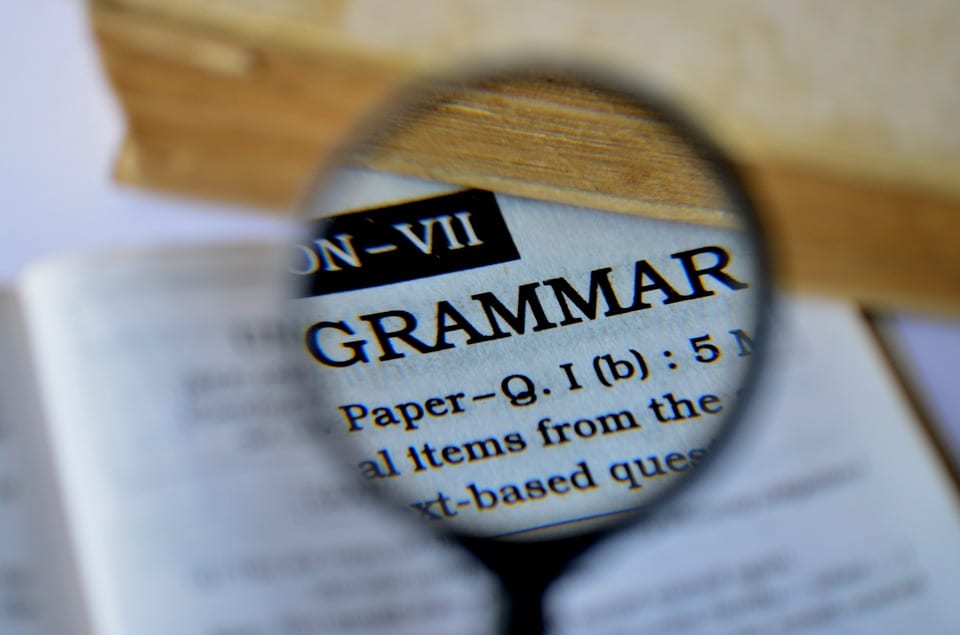
SOMEONE
“Someone” is another indefinite pronoun relating to people. You can use it to refer to a person in a situation when you don’t know who they are or their identity doesn’t matter:
Someone has eaten my cake.
You don’t know who that person is but the cake is missing. There must have been a person behind the action of eating it but you don’t know who they are.
She just wanted to tell someone about her secret.
She didn’t care who she was going to tell, in fact, it could have been anyone.
I need someone to help me with this task.
In this sentence, it doesn’t matter who the helper is as long as the person obtains assistance from them.
Is “someone” the same as “somebody”? Sometimes one word sounds better than another, which is why Freddie Mercury sings “Somebody to love”. “Someone” is also considered a bit more formal. Many people won’t notice the difference but to be on the safe side use “someone” rather than “somebody” in formal correspondence or in your essays.

NO ONE
“No one” is an indefinite pronoun used to refer to an absence of a person. There are two acceptable spellings of this word “no one” and “no-one”.
No one said anything in John’s defence.
To paraphrase, of all the people present, not even one person defended John.
He trusted no one in the whole world.
In other words, there was not even one person in the whole world that he trusted.
No one ever remembers my name.
Here “no one” is used for the purpose of exaggeration to express someone’s complaint about the fact that people seem not to remember their name.
Just like in the case of “anyone” vs “anybody” and “someone” vs “somebody”, “no one” is also considered more formal than “nobody”.
Do you understand now the difference between indefinite pronouns “anyone”,“someone” and “no one”? Do you know when it would be better to use “anybody”, “somebody” and “nobody” instead of them? Here’s a quick gap filling exercise to help you check your comprehension of the topic:
- I’ve asked you not to tell __________!
- I told __________.
- Well, __________ did say something because now my mother knows about it!
Are you ready for the answers? Scroll down…
…
…
…
…and down…
…
…
…
…In order of appearance, your answers should be ”anyone”, “no one” and “someone” with equally acceptable answers being “anybody”, “nobody” and “somebody”. Remember to avoid using the “-body” versions in the formal context.
You can use this article for reference, whenever in doubt. For best results with improving your English enrol in one of our courses and add a few private English lessons to your course!

